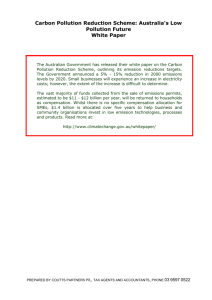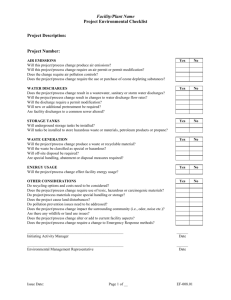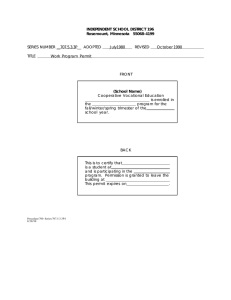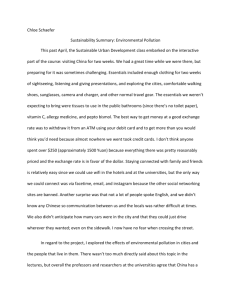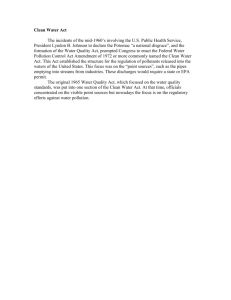pollution prevention & control Norfolk Local Authority Newsletter
advertisement
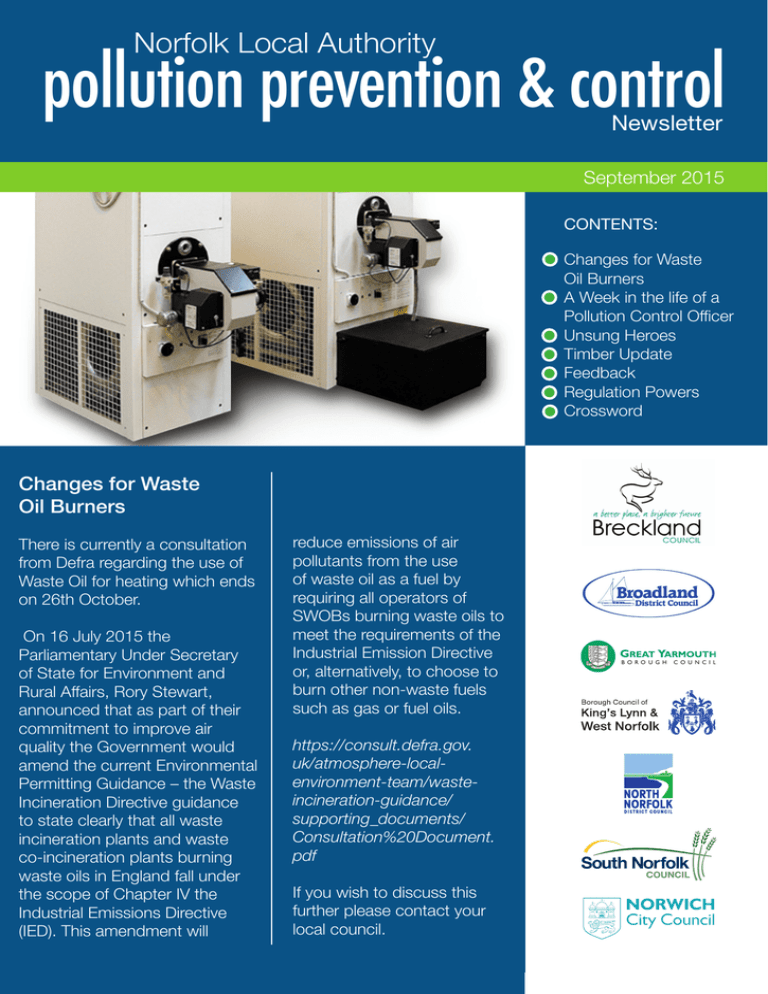
Norfolk Local Authority pollution prevention & control Newsletter September 2015 CONTENTS: Changes for Waste Oil Burners A Week in the life of a Pollution Control Officer Unsung Heroes Timber Update Feedback Regulation Powers Crossword Changes for Waste Oil Burners There is currently a consultation from Defra regarding the use of Waste Oil for heating which ends on 26th October. On 16 July 2015 the Parliamentary Under Secretary of State for Environment and Rural Affairs, Rory Stewart, announced that as part of their commitment to improve air quality the Government would amend the current Environmental Permitting Guidance – the Waste Incineration Directive guidance to state clearly that all waste incineration plants and waste co-incineration plants burning waste oils in England fall under the scope of Chapter IV the Industrial Emissions Directive (IED). This amendment will reduce emissions of air pollutants from the use of waste oil as a fuel by requiring all operators of SWOBs burning waste oils to meet the requirements of the Industrial Emission Directive or, alternatively, to choose to burn other non-waste fuels such as gas or fuel oils. https://consult.defra.gov. uk/atmosphere-localenvironment-team/wasteincineration-guidance/ supporting_documents/ Consultation%20Document. pdf If you wish to discuss this further please contact your local council. A Week in the life of a Pollution Control Officer MONDAY – It’s the start of the week and time to check all of the work that has arrived via the in-tray. A number of planning applications have been received by the Council and they must be commented on by Environmental Health. The Pollution Control Team reviews these planning applications and makes comments on potential pollution issues, including potential air pollution or developments that may be built on potentially contaminated land. If there is the possibility of either of these we can put conditions on the potential pollution issues. TUESDAY – It’s time to undertake a programmed A2 Process. The company will be visited and an assessment will be made on its compliance over the year. The officer will review the compliance of the company by undertaking a paper audit and a walk around the factory will also be required. WEDNESDAY – It’s time to replace the nitrogen dioxide diffusion tubes and to check the operation of our air quality monitoring station. We have a network of diffusion tubes located around the Borough and each month these need to be sent to a laboratory for analysis. The old tubes are replaced by a new tube on a monthly rotational basis and this requires an officer to drive around the Borough to collect and replace them. The officer will have to complete the relevant paperwork and send the tubes to an accredited laboratory. The air quality monitoring station is checked to ensure that it is analysing correctly. The Council has a legal duty to monitor for nitrogen dioxide levels as it is harmful to health. Nitrogen dioxide is produced by car engines and Industrial processes. THURSDAY – The Council has received a complaint from a neighbouring business on the Industrial Park who is complaining about emissions of paint spray from a company that holds a Permit with the Council. A pollution control officer will visit the site to ensure that they are complying with their Permit and take relevant actions depending on the potential breach. In the afternoon the Pollution Control Officer will be installing the local authority’s noise monitor in a residential property which resulted from a formal complaint by the householder. The householder is being affected by loud music from their neighbour who has a passion for heavy bass music. FRIDAY – It’s the final day of the week and the Pollution Control Officer is investigating a wood yard that undertakes a number of processes. The purpose is to determine whether or not the company should be operating with a Permit and to ensure they are not causing pollution. The company do undertake some wood processing operations and is believed to be carrying out wood treatment. The officer will visit the site and evaluate its processes to determine whether they meet the threshold for timber working or indeed the threshold for wood treatment. UNSUNG HEROES Did you know that Norfolk Regulators collectively inspect around five hundred premises as part of the LAPPC regime? Petrol Stations, Waste Oil Burners, Dry Cleaners and Vehicle Paint Resprayers make up the largest percentage of these inspections, but there are also Concrete Crushers, Crematoria, Coating Processes, Timber Processing, Animal Carcass Incineration and Sand Drying to name but a few more! Whilst not all of these premises need inspecting every year (if they are deemed low risk by the Regulator), work always continues behind the scenes to ensure Operators have the latest guidance and the most up to date and appropriate permit issued. As Regulators we work tirelessly to make sure your permit runs as smoothly and as painlessly as possible – if there is more you think we can do to improve our service to you please do get in touch! WHO IS MY REGULATOR? ENVIRONMENT AGENCY • Part A(1) installations: Emissions to Air/Land/Water Energy Efficiency Waste reduction Noise/Vibration Heat Raw Material Consumption Accident Prevention LOCAL AUTHORITY The definition between A1 and • A2 will be activity specific and may depend upon differences in capacity or the specific nature of polluting operations within that activity. Please refer to Schedule 1 (Part 2) of the EPR (2010) to see where your activity fits. http://www.legislation.gov.uk/ ukdsi/2010/9780111491423/ schedule/1/part/2 • Waste mobile plant • Part B installations and Part B mobile plant: Part A(2) installations: Emissions to Air/Land/Water Energy Efficiency Waste reduction Noise/Vibration Heat Raw Material Consumption Accident Prevention Emissions to air only • Waste operations, unless the waste operation is a Part B activity Please note that waste exemptions • Small waste incineration plants (Thermal rated input of less than 50 Megawatts) • Mining waste operations, including any carried on at a Part B installation • Solvent emission activities. may apply: https://www.gov.uk/environmentalpermit- check-if-you-need-one/permits • Radioactive substances activities • Water discharge activities • Groundwater activities, including those carried on at a Part B installation. Bespoke Permits If your activity does not fit within the definitions above, or more specifically those definitions listed in Schedule 1 (Part 2) EPR 2010, it is likely that you will need a bespoke permit. To determine if this is the case refer to Gov.UK on the following link: https://www.gov.uk/environmental-permithow-to-apply/bespoke-permit Part B Operators Look in Your Permit for Clues 2 3 5 1 4 6 7 8 9 10 11 12 13 14 15 16 17 18 20 21 22 19 TIMBER UPDATE The deadline for having an A2 permit for Timber Treatment PGN 6/03 now SG 11. was 7th July – if you haven’t applied and think you need one – get in touch now!! ACROSS 6 8 9 14 15 16 18 19 20 21 22 where things are made not allowed to emit this from your site need one to operate legally You get a visit from one periodically You have to complete one at each visit we all hate it but it has to be done or you pay more! you may have to do this for your emissions what smoke comes out of makes short work of concrete Have to comply with these don’t want this to persist DOWN 1 2 3 4 5 7 10 11 12 13 17 used for cleaning or thinning covers materials like wood, plastic or metal etc use one to keep your figures in order Mustn’t be seen across the boundary what you pay each year for a Permit Permits have quite a few of these what we try to protect with a Permit can be burned with a Permit they issue the Regulations none on the moon once each year REGULATORS’ CONTACT DETAILS: Breckland Environmental Protection e: envprotect@breckland.gov.uk t: 01362 656350 Broadland Environmental Protection Team e: envon.protect@broadland.gov.uk t: 01603 430488 Great Yarmouth Richard Alger e: raa@great-yarmouth.gov.uk t: 01493 84622 Feedback from Newsletter When asked whether operators would like us to keep the newsletter going the replies were: Like it...I love it. Superb! Yes please Keep it going Although very informative the DEFRA stuff is not the most exciting read..... I like it. I think it’s very informative. Thanks. Yes please keep it. Many thanks got the newsletter - all good stuff. Next issue..... source, pathway, receptor? Examples how minor leaks or leaching can cause big issues? Kings Lynn & West Norfolk Environmental Quality Team e: environmentalquality@west-norfolk.gov.uk t: 01553 616200 North Norfolk Environmental Protection Team e: ep@north-norfolk.gov.uk t: 01263 516 085 Norwich City Council Environmental Protection Team e: ehealth@norwich.gov.uk t: 0344 980 3333 South Norfolk Environmental Services e: envserv@s-norfolk.gov.uk t: 01508 533653 / 08081684444
